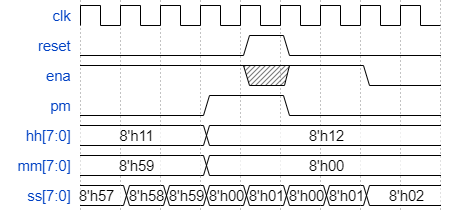计数器设计12小时时钟
- 题目
- 代码
题目
Create a set of counters suitable for use as a 12-hour clock (with am/pm indicator). Your counters are clocked by a fast-running clk, with a pulse on ena whenever your clock should increment (i.e., once per second).
reset resets the clock to 12:00 AM. pm is 0 for AM and 1 for PM. hh, mm, and ss are two BCD (Binary-Coded Decimal) digits each for hours (01-12), minutes (00-59), and seconds (00-59). Reset has higher priority than enable, and can occur even when not enabled.
The following timing diagram shows the rollover behaviour from 11:59:59 AM to 12:00:00 PM and the synchronous reset and enable behaviour.

这个题目的几个要求:
能够进行12小时计数,那就要求有秒,分钟,小时;
使用BCD计数器来实现;
复位有效时,复位到12点;
要能够区分上下午,上午pm为0,下午pm为1;
复位比使能优先级更高;
由于是时钟,所以是从1点到12点;
代码
题目中的时钟周期已经给出是1s,因此可直接用于计数。
不妨先设计出模60的BCD计数器和模12的BCD计数器。
模60的BCD计数器代码如下:
module counter_60 (
input clk,
input en,
input reset,
output reg[7:0] cout_out
);
always @(posedge clk) begin
if(reset)
cout_out <= 0;
else if(en) begin
if (cout_out == 8'h59)
cout_out <= 0;
else begin
if(cout_out[3:0] == 9) begin
cout_out[3:0] <= 0;
cout_out[7:4] <= cout_out[7:4] + 1;
end
else
cout_out[3:0] <= cout_out[3:0] + 1;
end
end
end
endmodule
模12的BCD计数器代码如下:
module counter_12 (
input clk,
input en,
input reset,
output reg[7:0] cout_out
);
always @(posedge clk) begin
if(reset)
cout_out <= 8'h12;
else if(en) begin
if (cout_out == 8'h12)
cout_out <= 1;
else begin
if(cout_out[3:0] == 9) begin
cout_out[3:0] <= 0;
cout_out[7:4] <= cout_out[7:4] + 1;
end
else
cout_out[3:0] <= cout_out[3:0] + 1;
end
end
end
endmodule
最后是顶层模块:
module top_module(
input clk,
input reset,
input ena,
output pm,
output [7:0] hh,
output [7:0] mm,
output [7:0] ss);
counter_12 counter1(
.clk(clk),
.reset(reset),
.en(ena&(ss == 8'h59)&(mm == 8'h59)),
.cout_out(hh)
);
counter_60 counter2(
.clk(clk),
.reset(reset),
.en(ena&(ss == 8'h59)),
.cout_out(mm)
);
counter_60 counter3(
.clk(clk),
.reset(reset),
.en(ena),
.cout_out(ss)
);
always@(posedge clk) begin
if(reset) pm <= 0;
else if(hh == 8'h11 && ss == 8'h59&& mm == 8'h59) pm <= ~pm;
else ;
end
endmodule
注意,顶层模块中,小时位,也就是counter1的计数使能en要设置为:
.en(ena&(ss == 8'h59)&(mm == 8'h59))
分钟位,也就是counter2的计数使能en要设置为:
.en(ena&(ss == 8'h59))
这段意思为:当秒数为59时,分钟位才能计数一次,分钟数为59时,小时位才能计数一次。
本文参考:HDLBits 系列(19) 12小时时钟的Verilog设计.
最后
以上就是温暖苗条最近收集整理的关于用计数器设计12小时时钟题目代码的全部内容,更多相关用计数器设计12小时时钟题目代码内容请搜索靠谱客的其他文章。








发表评论 取消回复